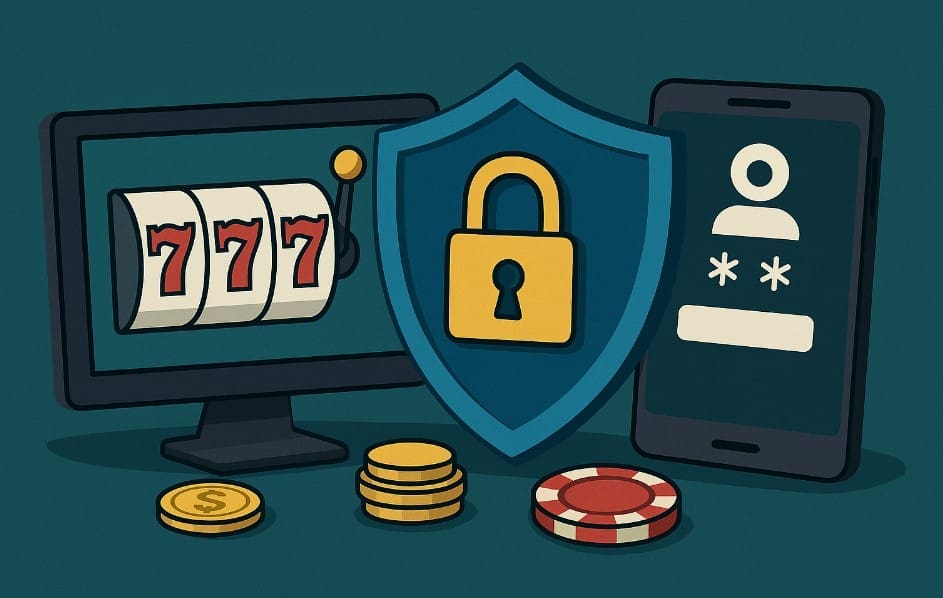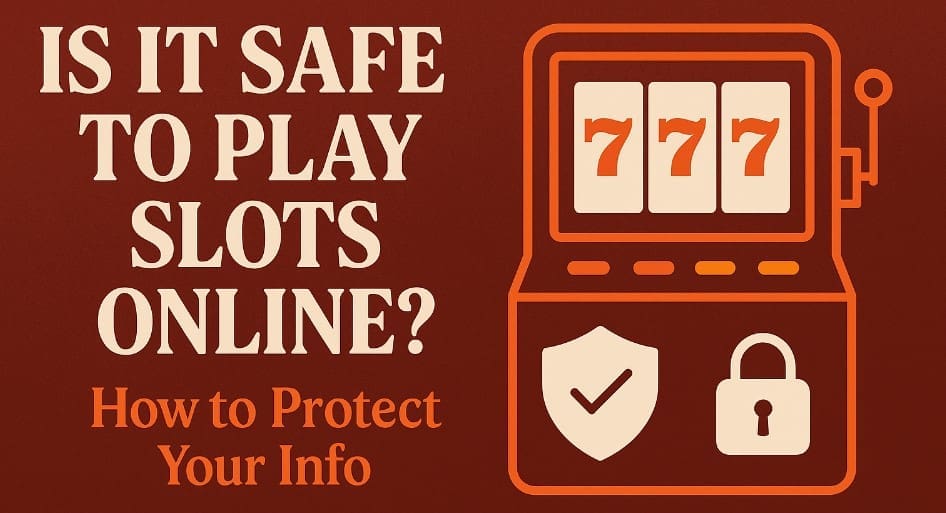Online slots have come a long way since the days of clunky browser games that looked like they were drawn with clip art. These days, you can load up a site and get something that looks like a console video game—complete with polished graphics, movie tie-ins, and soundtracks that could play on the radio. But the question that hangs over all the shiny bells and whistles is simple: is it actually safe? I’ve had friends ask me that right before they hit the “deposit” button. The truth is, yes, it can be safe—if you know what you’re doing. If you don’t, well, let’s just say you might end up with a horror story instead of a jackpot.
Why Safety Matters in Online Slots
The first time I ever tried an online casino, I signed up with the same kind of giddy excitement you’d get unwrapping a new phone. What I didn’t think about was the little detail of handing over my card info to a website I’d never heard of before. Turns out, that could’ve been a big mistake. Money isn’t the only thing at risk here—your personal info, your habits, even your email address can become fair game for shady operators. I’ve known people who ended up with their inbox flooded with junk mail just days after registering at a no-name casino. Lesson learned: safety isn’t optional, it’s essential.
How Safe Are Online Slot Games?
The funny thing is, the slot games themselves are usually the least of your worries. Big developers like NetEnt, Microgaming, Playtech, and Pragmatic Play don’t mess around. Their games are tested within an inch of their lives, using random number generators that get certified by labs like iTech Labs or eCOGRA. If you’re playing a real NetEnt slot, it’s as fair as a coin toss. The problem comes when the slot you’re looking at isn’t actually licensed or hosted by a real casino. I once clicked a link promising “free Mega Moolah spins” only to find a site that looked like it was designed in 2005 and asked me to install a plugin. Hard pass.
Identifying Legitimate and Licensed Casinos
One easy trick: scroll to the bottom of the page. The footer is where the real casinos show off their badges—Malta Gaming Authority, UK Gambling Commission, Gibraltar license, that sort of thing. If you don’t see anything there, or worse, you see a blurry logo that looks like it was copied and pasted, back away slowly. Good casinos are proud to wave their credentials like a kid showing off a report card. Bad ones either hide it or hope you don’t notice.
And honestly, if a casino hides its terms and conditions in some 20-page PDF you can’t even find, that’s a red flag too. The good operators don’t make you jump through hoops just to find out how your money is handled.
Data Security Features to Look For
Here’s a quick personal test I always do: I click the little padlock icon in the browser. If the site isn’t running on HTTPS, I’m gone. It’s like walking into a shop where the cash register is wide open—it just doesn’t feel right. SSL security, the encryption stuff that banks use, is a non-negotiable. Some casinos even go the extra mile with fraud detection tools, like flagging weird logins from different countries. You don’t see it happening, but it’s working in the background, like an invisible bouncer checking IDs.
How Encryption Protects Your Personal Info
Think of encryption as turning your personal info into scrambled eggs before sending it across the internet. The casino’s secure server is the only one with the frying pan to unscramble it back into something usable. Without that, you’d basically be shouting your card number across a crowded room. The industry standard is 128-bit or 256-bit SSL, and if you’re wondering, yes, that’s the same stuff your bank uses. If it’s good enough for them, it’s good enough for slots.
Payment Methods: What’s Secure?

Here’s where things get interesting. The safest bets (pun intended) are usually credit cards and well-known e-wallets like PayPal, Skrill, or Neteller. They add a nice cushion between your bank and the casino. I personally prefer e-wallets because if something goes wrong, my actual bank info isn’t floating around in a casino database. Prepaid vouchers can be useful if you’re nervous about overspending, though they’re a pain when you want to withdraw. Crypto is the wild card—it’s quick, but if you get scammed, good luck chasing down your coins.
A word of warning: if you stumble on a casino that only accepts some obscure payment method you’ve never heard of, it’s like someone asking you to pay in gift cards at a gas station. Walk away.
Two-Factor Authentication and Identity Verification
I used to groan every time a site asked me for two-factor authentication. Then one day, I got an email saying someone tried to log into my casino account from halfway across the world. The 2FA blocked it. After that, I never complained again. Adding that extra step—whether it’s a text message code or an app-based token—makes it much harder for anyone else to sneak in.
As for identity verification, yes, it feels awkward uploading a photo of your driver’s license to a casino. But casinos don’t ask because they’re nosey—they’re legally required to. It keeps money laundering in check and ensures that if you do hit a big win, the money goes to the right person. A little hassle upfront saves you a lot of headaches later.
How to Recognize Slot Scams and Fraud
I’ve seen some real eye-rollers in the scam department. One site promised a 500% bonus with zero wagering requirements. Sounds great until you realize no real casino can afford to hand out free money like candy. Unrealistic promises are a dead giveaway. Another is missing or vague terms. If you can’t find the rules for withdrawing your money, chances are you’ll never see it again.
Then there are fake slots. I once loaded a supposed NetEnt game that looked like the graphics were drawn in MS Paint. Spoiler: it wasn’t NetEnt. If the game looks “off” or runs suspiciously, it probably isn’t legit.
Role of Regulatory Bodies in Slot Safety
Regulators are the referees of this whole scene. The UK Gambling Commission is strict to the point of being scary for casinos—they require player funds to be held separately so your balance doesn’t vanish if the casino goes bankrupt. Malta Gaming Authority is another big name, known for solid international standards. And while eCOGRA isn’t a regulator, their certification is like a stamp of approval from a trusted third party. The point is, these groups aren’t just figureheads. If things go south, you’ve got someone to escalate complaints to.
Tips for Secure Online Slot Play
Here’s a little checklist I keep in the back of my mind:
- Always peek at the license before you hand over money.
- Turn on two-factor authentication—it takes 20 seconds.
- Stick to payment methods you’d use for shopping online, not just gambling.
- Keep your laptop or phone updated—yes, those software updates matter.
- Don’t ignore withdrawal rules. Casinos that delay or dodge payouts usually bury the warning signs in the fine print.
It’s not rocket science, but it makes all the difference between a fun night and a frustrating one.
FAQs: Keeping Your Data Safe While Playing Slots
Are online slots rigged?
If you’re on a licensed site with games from top providers like Microgaming or Playtech, no. They’re tested and certified. If you’re on a shady site… let’s just say the odds aren’t in your favor.
What’s the safest way to deposit money into an online casino?
I lean toward e-wallets like PayPal or Skrill. They keep your bank details hidden and have your back if something goes wrong. Credit cards work too, since you can request chargebacks.
How do I know if a casino is licensed?
Scroll to the footer. Real casinos will practically brag about their license. If all you see is some fuzzy logo that doesn’t link anywhere, that’s a bad sign.
What should I do if I suspect fraud?
Withdraw what you can, stop depositing, and reach out to the regulator if they’re licensed. Keep proof—screenshots, emails, everything.
Can malware affect online slot play?
Yes, especially if you download sketchy apps or click on “bonus” links from random sites. Stick to official app stores or the casino’s actual website.

